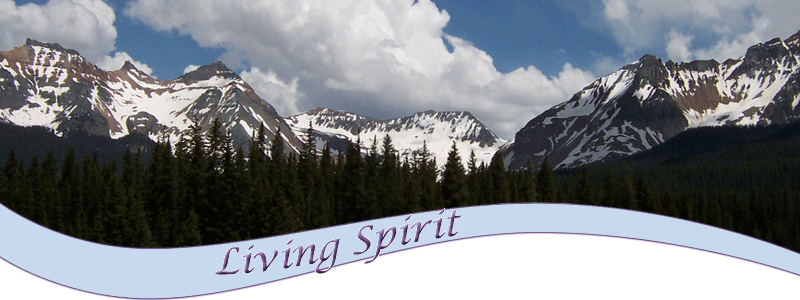Always Be Prepared for Your Death
by Jef Bartow
 I purposefully left this spiritual principle as one of the last in a series. It has some similarity to the ninth spiritualizing habit for life I have defined entitled Know When It's Time for Change. The reason this is the last spiritualizing habit is because it's the most difficult to accomplish. And as we shall see, death is merely a significant change in the life process.
I purposefully left this spiritual principle as one of the last in a series. It has some similarity to the ninth spiritualizing habit for life I have defined entitled Know When It's Time for Change. The reason this is the last spiritualizing habit is because it's the most difficult to accomplish. And as we shall see, death is merely a significant change in the life process.
 Whenever I write, I always begin by defining the terms which are going to be important. Just as Voltaire was a stickler for the language used in writing, I am very much a stickler for using the appropriate term and its meaning without clouding the picture with synonyms and/or overused words. Since this article is part of our series on principle-centered spirituality I'm going to rely on metaphysics and theology for our definition of death.
Whenever I write, I always begin by defining the terms which are going to be important. Just as Voltaire was a stickler for the language used in writing, I am very much a stickler for using the appropriate term and its meaning without clouding the picture with synonyms and/or overused words. Since this article is part of our series on principle-centered spirituality I'm going to rely on metaphysics and theology for our definition of death.
 Eastern mysticism defines a series of bardos that define the process of living and dying. Death is just part of this process. Because of this, preparing one for the transition of death is a highly important ritual, both before and after death of the physical body. Death is a "part, and only part, of beginningless and endless movement. The uniqueness and power of the bardo teachings is that they reveal to us, by showing with total clarity the actual process of death, the actual process of life as well."
Eastern mysticism defines a series of bardos that define the process of living and dying. Death is just part of this process. Because of this, preparing one for the transition of death is a highly important ritual, both before and after death of the physical body. Death is a "part, and only part, of beginningless and endless movement. The uniqueness and power of the bardo teachings is that they reveal to us, by showing with total clarity the actual process of death, the actual process of life as well."
Our articles are available for reproduction for all members. Please give credit to the author.
For non-members, please contact us for permission to reproduce articles.
 Just as our daily life process includes a phase of outer activity and a period of rest for regeneration, our overall life process includes cyclic periods of outer manifested activity and inner periods of regeneration and balancing as preparation for a new outer life focus. The difference is that our normal daily life process is one of our Personality while our overall life process is that of our soul. And here's where things get sticky in that the more we identify and remain attached to our Personality, the more we fear death as the end of our personality life. The unfortunate reality is that until we have fully developed a subjective self-conscious Soul and objective Self, death is an end to who we are.
Just as our daily life process includes a phase of outer activity and a period of rest for regeneration, our overall life process includes cyclic periods of outer manifested activity and inner periods of regeneration and balancing as preparation for a new outer life focus. The difference is that our normal daily life process is one of our Personality while our overall life process is that of our soul. And here's where things get sticky in that the more we identify and remain attached to our Personality, the more we fear death as the end of our personality life. The unfortunate reality is that until we have fully developed a subjective self-conscious Soul and objective Self, death is an end to who we are.
 The Tibetan equates death with "The Process of Restitution." This process governs the "period of withdrawal of the soul from the physical plane." "This concerns the Art of Dying." His definition of death is as follows: "Death itself is a part of the Great Illusion, and only exists because of the veils we gather around ourselves." "Through death, a great at-one-ing process is carried forward... Death, if we could but realize it, is one of the most practiced activities."
The Tibetan equates death with "The Process of Restitution." This process governs the "period of withdrawal of the soul from the physical plane." "This concerns the Art of Dying." His definition of death is as follows: "Death itself is a part of the Great Illusion, and only exists because of the veils we gather around ourselves." "Through death, a great at-one-ing process is carried forward... Death, if we could but realize it, is one of the most practiced activities."
 Much has been written regarding how older people getting close to death begin a preparation process for death. It's as though we hold on to life until it becomes too difficult, then we get ready for death, which proceeds fairly soon after. For many in nursing homes or living with relatives, holding onto life can be assisted by various caregivers long after any form of productive or meaningful life activity ceases. I consider this a tragedy of human nature attached and bound to instincts and an unspiritual life.
Much has been written regarding how older people getting close to death begin a preparation process for death. It's as though we hold on to life until it becomes too difficult, then we get ready for death, which proceeds fairly soon after. For many in nursing homes or living with relatives, holding onto life can be assisted by various caregivers long after any form of productive or meaningful life activity ceases. I consider this a tragedy of human nature attached and bound to instincts and an unspiritual life.
 As to our spiritual principle here, it may seem somewhat absurd to prepare for your death in the middle of life. To better understand this principle, let's outline what we would do to prepare for death right now. First, if we are going to die soon, how important are the on-going conflicts with family, friends and coworkers that many tend to hold onto. Wouldn't it be a good process to resolve these conflicts, or simply let them go.
As to our spiritual principle here, it may seem somewhat absurd to prepare for your death in the middle of life. To better understand this principle, let's outline what we would do to prepare for death right now. First, if we are going to die soon, how important are the on-going conflicts with family, friends and coworkers that many tend to hold onto. Wouldn't it be a good process to resolve these conflicts, or simply let them go.
 And besides conflicts, would not it be beneficial to help those close to us become truly independent of us before we die. It's fairly obvious to see how losing a parent or close loved one to soon makes life more difficult, at least for a period of time. Our normal relationships are typically either dependent or co-dependent oriented. Even inter-dependent relationships are hard to let go of.
And besides conflicts, would not it be beneficial to help those close to us become truly independent of us before we die. It's fairly obvious to see how losing a parent or close loved one to soon makes life more difficult, at least for a period of time. Our normal relationships are typically either dependent or co-dependent oriented. Even inter-dependent relationships are hard to let go of.
 Thirdly, what about the "unfinished business" that is left hanging when someone dies unexpectedly. We are all taught and conditioned to "put our house in order" in the latter part of life. This then makes our death non-burdensome to those around us after we're gone. Isn't this why we create a will, create powers of attorney and invest in life insurance? I can certainly attest to what is normally not communicated, but is experienced by those close loved ones after someone dies. Resolving the house, furniture, clothes, belongings, bank accounts, investments, etc. etc. is a painful grief oriented process.
Thirdly, what about the "unfinished business" that is left hanging when someone dies unexpectedly. We are all taught and conditioned to "put our house in order" in the latter part of life. This then makes our death non-burdensome to those around us after we're gone. Isn't this why we create a will, create powers of attorney and invest in life insurance? I can certainly attest to what is normally not communicated, but is experienced by those close loved ones after someone dies. Resolving the house, furniture, clothes, belongings, bank accounts, investments, etc. etc. is a painful grief oriented process.
 In many religious circles, the coming of death triggers certain rituals. These can include receiving "absolution of sins," or seeking purification for how one has lived instinctually, emotionally or morally. We are again taught to "make peace with God" before we get to the pearly gates. Seeking forgiveness for how we lived our life is a vital part of many religious practices. Unfortunately, unless we "go and sin no more," we continue to build karma which will be left for resolution in a future embodiment. The foundation of this is to spend time in reflection and restitution before the end of life.
In many religious circles, the coming of death triggers certain rituals. These can include receiving "absolution of sins," or seeking purification for how one has lived instinctually, emotionally or morally. We are again taught to "make peace with God" before we get to the pearly gates. Seeking forgiveness for how we lived our life is a vital part of many religious practices. Unfortunately, unless we "go and sin no more," we continue to build karma which will be left for resolution in a future embodiment. The foundation of this is to spend time in reflection and restitution before the end of life.
 Now that we've defined major components of preparing for death, how are they a spiritual principle for living life? The answer is simple. Each of these preparation processes for death is also a spiritualizing process in life. On the Spiritual Path, resolving family and relationship issues and dependency is an early step in becoming an initiate. Many times this involves ending (death of) relationships which are not conducive and supportive in spiritual growth. Frankly, the reality is that most to all of our relationships when we begin the Spiritual Path will die in our spiritual growth process. What's supported our personality life will rarely support our spiritual life.
Now that we've defined major components of preparing for death, how are they a spiritual principle for living life? The answer is simple. Each of these preparation processes for death is also a spiritualizing process in life. On the Spiritual Path, resolving family and relationship issues and dependency is an early step in becoming an initiate. Many times this involves ending (death of) relationships which are not conducive and supportive in spiritual growth. Frankly, the reality is that most to all of our relationships when we begin the Spiritual Path will die in our spiritual growth process. What's supported our personality life will rarely support our spiritual life.
Spiritual growth means ultimately becoming inter-independent in all relationships. The time to do this is not when we're close to death. It is to actively proceed toward detachment in relationships as a means of ending the suffering which the Buddha taught is what inhibits our spirituality. Preparing our spouse and children now is just as positive as separating from our parents was when we were younger.
 Another term for unfinished business is karma. Spiritually, we have to transmute our positive karma as well as our inhibiting karma in order to truly free ourselves from the bounds of re-embodiment. Our journey is not complete until we have resolved all of our karma here in this classroom of spiritual education. You don't leave school until you completed every assignment and receive your final report card. Fortunately, it doesn't require all A’s, only passing grades.
Another term for unfinished business is karma. Spiritually, we have to transmute our positive karma as well as our inhibiting karma in order to truly free ourselves from the bounds of re-embodiment. Our journey is not complete until we have resolved all of our karma here in this classroom of spiritual education. You don't leave school until you completed every assignment and receive your final report card. Fortunately, it doesn't require all A’s, only passing grades.





